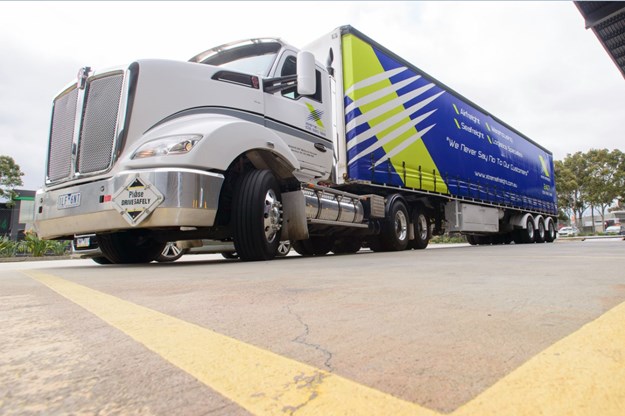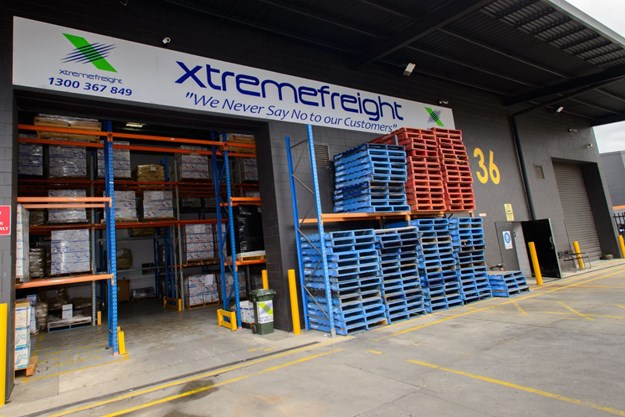Xtreme Freight CEO Amanda O’Brien wants a greater focus on mental health in the trucking and logistics sector
Amanda O’Brien gets three messages on average a week from complete strangers within the transport and logistics sector asking for her advice on workplace bullying and stress.
Being one of the few female industry leaders, O’Brien, who is also the CEO of the Supply Chain and Logistics Association of Australia (SCLAA), has seen an increase in the number of men and women approaching her for help.
Those pleas spiked following her speech at the Transport Women Australia’s Creating Connections conference earlier this year about her warehouse employee who had committed suicide.
With mental health being a sensitive subject, O’Brien is encouraging fellow workers to open up about their ideas and emotions, calling on managers to shine a light on mental health issues.
“There’s not enough focus on mental health in the transport and logistics sector,” O’Brien says. “There’s a lot of fatigue involved within the industry and also a lot of pressure from management all the way down; you’re always constantly trying to meet consumers and customers’ demands so it takes a very big toll on some people mentally.
“I think employers need to be supportive of more flexible hours in the market place and understand that it’s important to have a backup and train people in the same role so that you’re never reliant on the same person and they have to take that burden on.”
The tragic way such issues can unfold became real in O’Brien’s business.
“We’ve had one very sad incident where a young man we put through some training, and he was a very outstanding individual, well-spoken and a hard worker, had committed suicide,” O’Brien recalls. “He had some problems in life we had no idea about, and ever since then mental health is a big part of what we do here; we’re constantly having courses and people come in and motivate teams just so they feel they’re being supported.
“There’s a mentor or a manager in place who they can talk to because it’s a very hard industry to be in.”
Practical measure
Xtreme Freight has joined forces with suicide prevention charity RUOK, which aims to stimulate conversation to help prevent suicide.
“It’s about supporting, but I think there should be more focus from the government on mental health in transport and logistics,” O’Brien says.
“I’ve seen quite a lot of horrible things happen in transport; I’ve seen guys run over by trucks and all sorts of things but I think you just build up resilience.
“My worker’s suicide did affect me but at the same time I can’t let it affect me because I’ve got people I need to run and staff I have to look after so it’s really important that I maintain and follow all the right procedures to make sure that incident is handled well and that our staff is supported.”
With younger staff joining the team, those older employees are now looking after their fellow workers, making sure they feel supported.
“It’s something that’s been a very tough industry and guys don’t talk about how they’re feeling or what they’re going through, but at Xtreme Freight we try and change that,” O’Brien says. “It’s about having open conversations and if somebody is feeling ill or feeling they’re under pressure or not supported, they can come and talk to me.”
Focus on women
With the industry gender gap under the spotlight, O’Brien believes women entering the sector should be given training in mental resilience due to the industry’s unique nature.
“There should be more focus on courses within the transport and logistics industry for mental resilience or coping mechanisms because it is an industry unlike any other,” she says. “Even those women I put in training, they last five minutes.
“It’s almost like you have to have a separate training program on how to cope at a warehouse and distribution,” she adds.
“I don’t want it to look like it’s my fault because they get as much support as they need but there’s not a focus on that sort of training; it’s different to driving a truck and learning how to do anything with transport; they need mental skills for the transport industry.”
O’Brien is unsure how to handle the many messages she receives from industry people asking for help, saying the freight transport management needs to unite and come up with a plan.
“These people are tired and get burnt out very quickly, their careers are only short in certain roles and they have to move on to something else because they’re not supported,” she says.
“That’s why I paint the real picture for the young people that I employ and I’m considering getting a psychologist come up with a virtual reality program for mental health within the transport industry.”
Xtreme Freight CEO Amanda O’Brien has pushed down a lot of doors to get ahead. Read more, here
Graduate program
Xtreme Freight has recruited several medical and pharmaceutical graduates due to transport labour shortages, saying they’ve got “incredible brains” and bring a different skillset.
“They’re more analytical, and transport and data is all about running reporting and building efficiencies into the market place and they know the freight and the chemical makeup of it,” O’Brien says.
“It’s about looking elsewhere; if people have got the skillsets and they try it out and love it, then why not?”
The company has grown by 20 per cent over the last two years, adding another 20 vehicles to its fleet. Known to be the quiet operator, Xtreme Freight has started advertising its brand more, which has helped improve its image.
“You have to innovate and be different to the rest of the crowd, you have to stand out,” O’Brien says. “I used to like to blend in and we still do to a certain extent but we’re getting more trucks with our curtains on it and we need the presence in the market place now more so than before.”
Xtreme Freight carries all sorts of freight, from cement and piping to retail. It is the last piece of the logistics puzzle and can handle most demanding jobs thanks to its experienced staff.
It has purchased 35 specialised Kenworth and Toyota vehicles, ranging from tray and crane trucks, semi-trailers and B-doubles, and has also invested in 10 TCM and Toyota forklifts. The company has also upgraded its technology services, investing $200,000 in a virtual reality visual training program for new and existing staff.
“Instead of giving somebody a 60-page manual, which they don’t really take a lot of in, this is like a gaming system where they’re training and utilising their environment so you can track the statistics if they’re poor, and they can refresh their training and are not allowed to go out if they don’t get above 85 per cent,” O’Brien says.
The 3D simulation training and assessment program was designed by digital start-up Bondi Labs and includes training in vehicle loading, warehouse safety as well as induction and first aid.
It will be implemented on December 1.
Path to agility
The ability for quick action and effective on-the-spot decision making is a critical skill that O’Brien has. She’s looked for inspiration from similar overseas businesses, saying the increased demand coming from customers keeps her looking for the next thing.
“I’m always looking at what’s happening globally and mixing with people who have larger companies overseas and what sort of systems they’re using and that helps us to become innovative because we want to actually bring that to market first,” O’Brien says.
She’s gained another 20 customers over the last two years thanks to flexible business approach.
“I had an opportunity to start Xtreme Freight overseas a few years ago but I just didn’t have the capital,” she says. “I would rather be sustainable long-term and survive than invest all my eggs and then get wiped out and I’ve seen it happen to plenty bigger ones than me; they’ve invested at the wrong time in the wrong company at the wrong acquisition and they’ve gone the next day.
“I reckon Indonesia has got enormous opportunities and Singapore would be amazing just because I’ve made a lot of contacts there.
“We’ve done enormously well over the last two years and we’re really happy and want to see that trajectory keep on going, but it’s only through innovation and looking at our business in different ways that will have that happen,” she adds.
“It’s conscious improvement and the only thing at the end of the day is exceptionally high customer service, which encompasses so many areas.”
For help or information contact Lifeline on 13 11 14, or beyondblue on 1300 224 636.




